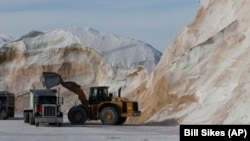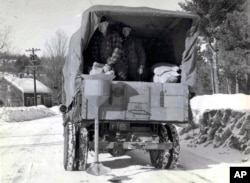Communities in the Northern parts of the United States have used salt to keep icy roads safe during winter for many years. But, some experts now say salt harms nearby fresh water supplies.
Putting salt on icy roads helps reduce traffic accidents and prevents people from slipping and falling on roads and walkways.
But researchers have found growing evidence that salt used on roads is increasing the salinity in many lakes in the U.S.
Instead, they recommend using other materials such as beet juice, molasses, or even waste products from making beer or cheese.
Victoria Kelly is a road salt expert at the Cary Institute of Ecosystem Studies in New York. She said scientists have been seeing increased amounts of salt in streams, rivers and lakes.
Now, she said, scientists are asking: “What is going to happen to the organisms living in freshwater bodies and what will happen to the freshwater bodies as a whole?”
New tools for keeping roads safe
Road salt is believed to have been first used in the 1940s in the state of New Hampshire. It became the main tool for removing ice from roads as cities expanded, highways were built and drivers began expecting clear roads.
It is estimated that more than 20 million tons of salt are used each winter in places like the Northeastern and Midwestern United States.
But many state and local agencies are looking for ways to reduce salt use because its harmful effects on the environment are becoming clearer.
Some agencies now use high-technology equipment to spread salt more effectively. Others are trying to study weather reports to make better decisions about when to use salt. Another new tool is liquid organic products that help salt stick to roads so it does not wash away easily.
For example, agencies in states such as New Jersey and North Dakota are using a mixture that includes beet juice to keep ice off of roads. New Hampshire and Maine use molasses. Highway departments also have used beer waste and pickle brine. In at least one county in Wisconsin, cheese brine was used.
Jonathan Rubin is director of the Margaret Chase Smith Policy Center in Maine. He is the lead author of a 2010 report on salting roads in the state.
“Adding salt to the environment does have negative impacts, but for those of us in the Northeast, especially in rural states, where driving is the predominant way of getting around, we need mobility,” said Rubin.
“In my opinion, we are always going to be using some degree of road salt,” he said. “The question is, can we use less?”
Leaving a salty taste in freshwater
Experts say salt corrosion already causes billions of dollars in damage each year to cars, roads and bridges. They also say there are growing signs that road salt is getting into freshwater.
In the past 50 years, chloride levels in some lakes and rivers are four times higher than normal. In a few cases, they are one hundred times higher.
Last year, a study in the Proceedings of the National Academy of Sciences found that more than 40 percent of the lakes studied showed long-term salinization.
The researchers estimated that by 2050, nearly 50 lakes in the study will have chloride levels that threaten freshwater plants and animals.
Other studies have shown that salinization of lakes and streams reduces the numbers of fish and amphibians and kills plants.
Caleb Dobbins is New Hampshire’s highway maintenance engineer. Although there are concerns, he does not think salt will be replaced anytime soon. Other chemicals, he notes, are more expensive than salt and have their own environmental risks.
I’m Phil Dierking.
Michael Casey originally wrote this story for the Associated Press. Phil Dierking adapted this story for VOA Learning English. Mario Ritter was the editor.
What do you think is worse, icy roads or making freshwater too salty? Why? We want to hear from you. Write to us in the Comments Section or on our Facebook page.
________________________________________________________________
Words in This Story
salinity - n. the amount of salt in something
molasses - n. a thick, brown, sweet liquid that is made from raw sugar
concentrations - n. a large amount of something in one place
organic -adj. grown or made without the use of artificial chemicals
brine - n. a mixture of salty water used especially to preserve or add flavor to food
predominant - adj. more important, powerful, successful, or noticeable than other people or things
corrosion - n. to slowly break apart and destroy (metal, an object, etc.) through a chemical process
amphibians - n. an animal (such as a frog or toad) that can live both on land and in water








